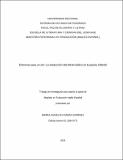| dc.contributor.advisor | Miranda Vargas, María del Rocío | |
| dc.contributor.author | Mora Godínez, María Angélica | |
| dc.date.accessioned | 2020-06-29T21:00:17Z | |
| dc.date.available | 2020-06-29T21:00:17Z | |
| dc.date.issued | 2015 | |
| dc.identifier.other | 000284048 | |
| dc.identifier.uri | http://hdl.handle.net/11056/17671 | |
| dc.description | Maestría en Traducción Inglés-Español | es_ES |
| dc.description.abstract | Este trabajo, en la modalidad de traducción e informe de investigación, se centra en la traducción de la poesía infantil, específicamente del efecto lúdico de una serie de poemas en la obra Entonces pasa un sol1 del autor costarricense Luis Enrique Arce. Este trabajo parte de los postulados de la teoría de Skopos propuesta por Reiss y Vermeer (1996), los cuales tienen la particularidad de establecer el propósito como eje fundamental de toda traducción. Se busca delimitar una serie de pautas que contribuyan a traducir el efecto lúdico en textos literarios dirigidos a una audiencia infantil. Con este propósito en mente, se emplea el método libre, propuesto por Amparo Hurtado (2001) para formular el planteamiento de técnicas de traducción. En principio, para abordar el tema se determina que las imágenes literarias, la musicalidad, la sustitución vocálica y las ilustraciones son los elementos más representativos en todo texto infantil. Este proceso de traducción incluye el desarrollo de fases para investigar el tema, proponer las técnicas de traducción y corroborar la efectividad de las mismas. En conclusión, se determina que se puede traducir el efecto lúdico del objeto de estudio mediante la aplicación de las técnicas propuestas. | es_ES |
| dc.description.abstract | This paper, a research project and translation, focuses on the translation of poetry for children specifically, it deals with the translation of the ludic effect immerse in the poems of the text Entonces pasa un sol2 wrote by Luis Enrique Arce. The study takes into consideration Skopos theory as a theoretical framework which positions the purpose as the main objective of any translation. Some principles are created to translate the ludic effect included in literary texts addressed to a child audience. With this purpose in mind, a free translation method, proposed by Amparo Hurtado Albir (2001), is used to formulate these techniques. To address the subject, literary images, musicality, substitution of vowels and illustrations are classified as the most representative elements in children texts. The translation process is carried out in different phases: topic research, translation proposal, revising of effectivity. In conclusion, the ludic effect included in the object of study can be translated if the translator applies the proposed techniques. | es_ES |
| dc.description.sponsorship | Universidad Nacional, Costa Rica | es_ES |
| dc.language.iso | spa | es_ES |
| dc.publisher | Universidad Nacional, Costa Rica | es_ES |
| dc.rights | Acceso abierto | es_ES |
| dc.rights | Attribution-NonCommercial-NoDerivatives 4.0 Internacional | * |
| dc.rights.uri | http://creativecommons.org/licenses/by-nc-nd/4.0/ | * |
| dc.subject | POESÍA INFANTIL | es_ES |
| dc.subject | INTERPRETACIÓN (TRADUCCIÓN) | es_ES |
| dc.subject | MÉTODOS DE ENSEÑANZA | es_ES |
| dc.subject | DESARROLLO INFANTIL | es_ES |
| dc.subject | MÚSICA PARA NIÑOS | es_ES |
| dc.subject | CHILDREN'S POETRY | es_ES |
| dc.subject | INTERPRETATION (TRANSLATION) | es_ES |
| dc.subject | TEACHING METHODS | es_ES |
| dc.subject | CHILD'S DEVELOPMENT | es_ES |
| dc.subject | CHILDREN'S MUSIC | es_ES |
| dc.title | Entonces pasa un sol: la traducción del efecto lúdico en la poesía infantil | es_ES |
| dc.type | http://purl.org/coar/resource_type/c_bdcc | es_ES |
| una.tesis.numero | 418.02 M827e | es_ES |
| dc.description.procedence | Escuela de Literatura y Ciencias del Lenguaje | es_ES |


